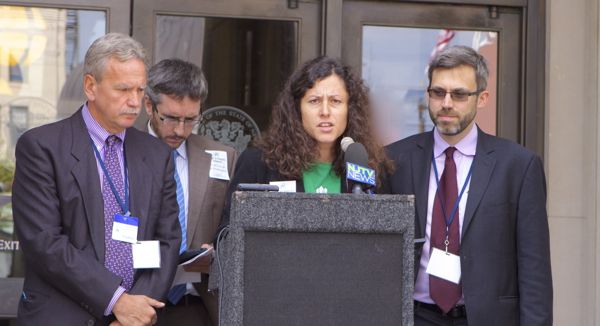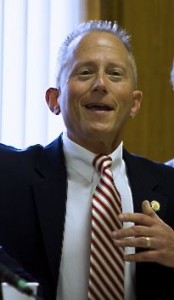Flying Blind on Open Space – And Lying About It
What will be the result of diverting $100 million/year from DEP environmental programs?
Don’t Ask Because No One Knows
You go to war with the army you have – not the army you might want or wish to have at a later time. ~~~ Secretary of Defense, Donald Rumsfeld
This is the ballot question we have. It is up to all of us to work together and pass it whether you like it or not, because losing will cause bigger harm to the environment. ~~~ Director of NJ Sierra Club, Jeff Tittel
I spent several hours last night doing research on the legislative history of the Open Space ballot question.
I began my research at the prompting of a news editor, who yesterday sent me an October 6 Sierra Club press release that the editor felt was a response to my October *6 PEER press release on the the negative impacts the would result from the open space ballot question.
Sierra Club’s October 6 press release provided very lame (and false) excuses for the DEP environmental program cuts they supported and then went on offense with this indirect attack:
To be clear this dedication is not going to zero out funding for parks and park maintenance because park capital repairs is still included in the question and the money will be set aside during the implementation legislation. None of this money is going to go too (sic) maintenance, it goes for capital repairs. The Site Remediation funding was supposed to go towards cleanup sites especially orphaned sites and not for staff. The money that used to go to staff from the Spill Act now goes to balance the budget. Also $100 million from the Passaic River cleanup settlement is being diverted to the general fund. Money for Watershed programs were supposed to go to water projects, restoration programs, and to towns for water shed (sic) planning not for staff.
People are criticizing this dedication, but where were these people for the last 2 years when Sierra Club was fighting money being taken from other programs to fund open space or supporting us on a water fee for open space? We are committed to getting additional funds for these programs from other sources.
I took NJ LCV to the woodshed for similar falsehoods and spin, so before I get to the legislative history (which has Tittel’s fingerprints all over it) let’s take my friend Jeff Tittel’s press release claims quickly in order: (please read the OLS fiscal estimate to get the law and the facts straight).
- Parks funding
First, you can read a DEP parks employee go into great detail on the issues.
Firstly, Tittel seems confused about what a capital project is and is dead wrong about the deferred maintenance backlog and capital projects. The DEP staffer explained:
Back in 2006, voters were asked to approve, and overwhelming did, a constitutional amendment that authorized 15% of corporate business tax (CBT) funds to assist NJ State Parks & Historic sites with major deferred maintenance known as capital projects.
Next, read the OLS fiscal estimate and see that the Ballot question does in fact legally terminate and “zero out” the current Constitutional dedication of 32% (about $32 million/year) of CBT funds to parks:
for financing improvements and facilities for recreation and conservation purposes on parks and other preserved open space lands
Tittel does not seem to understand the legal meaning of a dedication to a specific use versus authorization of a range of allowable uses, and is totally clueless about how that influences political decisions on allocation of funds and impacts the administration of funds at DEP.
The current *$32 million Constitutional dedication in under the total control of DEP’s Parks program for specific parks related purposes. Parks has a $400 million maintenance backlog, so that funding is already spoken for.
[* it increases from 15% to 32% in 2016, when diesel retrofit funds are shifted to parks]
Take a look at what that funded this year, per DEP reply to OLS questions:
State Parks Projects:
The projects below are being funded from the department’s appropriation for Recreational Land and Development (CBT dedication); reimbursement is being sought from FEMA Public Assistance funding and from the Community Disaster Block Grant – Disaster Recovery funding (State’s ten percent share)::
Current:
- Island Beach State Park, Fisherman’s Walkway Reconstruction $181,109 7/1/14
- Leonardo State Marina, Temporary Office $128,180 7/1/14
- Leonardo State Marina, Maintenance Area Gasoline Tank Repairs $57,041 7/1/14
- Liberty State Park, Ferry Slip/Walkway Repairs $938,696 5/31/14
- Liberty State Park, Terminal Exterior Repairs $4,798,758 9/1/14
Planned:
- Leonardo State Marina, Demolition of Various Damaged Structures $75,000 9/1/14
- Leonardo State Marina, New Office/Visitors Service Complex $2,000,000 12/31/16
- Liberty State Park, Terminal Interior, Mechanical, Plumbing, Electrical Restoration $7,500,000 6/15/15
- Liberty State Park, Interpretive Center Restoration $2,000,000 6/30/16
The proposed ballot question would significantly change that.
It would legally abolish the currently dedicated 32% to parks and pool it with other allowable uses., specifically, 71% – 78% for the preservation and stewardship of open space (Green Acres), farmland, historic sites, and flood-prone areas (Blue Acres).
Does Tittel not understand that this means that parks would have to compete with HUGE unmet needs for open space, farmland, historic sites, and blue acres?
There is no way – none whatsoever, that parks will get anywhere near the $32 million – that would be 45% of the new total pool of funds.
Far more likely, parks would be on the short end of the funding stick when competing against all those other very popular and hugely unmet needs. Parks simply will not be able to win the bureaucratic and political war for scarce funds.
That lack of political clout and support at DEP is what created the $400 million deferred maintenance backlog in State Parks. Had Parks been able to compete effectively for DEP funds, that backlog would never have been created.
- DEP salaries
For the record, contrary to Mr. Tittel’s false claim, the original 1996 CBT ballot authorized DEP to use funds for salaries. In fact, it was drafted, in part, in response to Gov. Whitman’s budget cuts and layoffs at DEP. Since then, for 18 years, the Legislature has annually appropriated CBT funds to specific DEP program staff in every DEP budget, and DEP has been spending CBT funds on DEP staff. Here is OLS on that:
under the current constitutional dedication, up to 9% of the total amount dedicated may be used to pay for administrative costs of the State’s hazardous substance discharge program.
Even more broadly, here is how DEP advised the legislature regarding the use of CBT funds during the FY’15 budget review:
- [OLS] Question: How many positions in the DEP are funded in whole or in part by the Corporation Business Tax dedication? Please provide a breakdown by program.
- [DEP] ANSWER: Approximately 266 positions in the DEP are supported by the Corporate Business Tax dedication. 230 of these positions are on accounts directly funded by CBT appropriations. The remaining are funded via reimbursement from CBT funds.
Below is the breakdown by program:
- Site Remediation- 107 positions
- Compliance & Enforcement/UST Inspections- 10 positions
- Water Monitoring & Planning- 123 positions
- Air Quality- 8 positions
- Parks Management- 18 positions
How could Tittel and others now object to this when they knew or should have known that CBT funds were used for hundreds of DEP salaries for 18 years?
- History – where were these people for the last 2 years
Mr. Tittel also knows that I have been fighting DEP budget cuts and diversions since 1985 both from within DEP and in the non-profit sector. Over that 30 year period, I have written about and testified multiple times to the legislature and in other DEP fora in support of all sorts of fees, taxes, fines, and funds to support various infrastructure and environmental programs.
Tittel himself testified on March 17, 2014 to the Senate Environment Committee (link below) and explicitly recognized my work on the original 1996 CBT dedication, which was done BEFORE Tittel was even with Sierra Club’s staff.
- Current Uses of CBT Funds that would be diverted to open space
Contrary to the documentary practice of PEER, which always provides links to source documents, we note that Tittel provides no data or documents to support his false and misleading claims, so here are the facts, with links to the underlying official documents:
The current CBT dedication provided $103 million to DEP in the FY 2015 budget (DEP section starts on page D-105).
Since 1996, 4% of the revenue annually derived from the tax imposed by the Corporation Business Tax Act (P.L.1945, c.162) has been dedicated to the Department. A portion of this dedication has been used for the following purposes: watershed-based water resource planning and management, financing the cost of water quality point and nonpoint source pollution monitoring, nonpoint source pollution prevention projects, Total Maximum Daily Load (TMDL) development and implementation, as well as lake restoration and grants. Conducts planning on watershed management, water quality, water supply, coastal zone management, nonpoint source control, stormwater management, and other planning requirements associated with the federal Clean Water Act and the New Jersey Water Quality Planning Act. Also administers the National Estuary Program and federal Section 604(b) water quality management planning.
As outlined in the FY’15 budget, here is how the current CBT funds are allocated among DEP programs (all of these will be cut under the Open Space Ballot diversion):
- $16 million goes to science and technical programs (water supply, science support, & land use regulation)
- $53 million goes to site remediation and waste management
- $18.1 million to environmental regulation
- $16 million to natural resource management (development and conservation of recreational lands)
Additionally, the CBT funds municipal brownfields cleanup and redevelopment projects and provides millions of dollars in grants to homeowners to remove underground storage tanks.
Tittel also knows that I was the author of the 1997 Watershed Management Act that created the current watershed planning process. His claims about watershed planning funds are flat out false.
- Legislative History of Open Space Ballot Question
Now that Tittel’s spin has been exposed as false and misleading, lets now ask: How did this happen?
I was trying to get my head around how we could possibly have come to a point where $100 million per year of funds dedicated to specific DEP programs (i.e. parks maintenance, water resources, & toxic site cleanup) will be eliminated – and without a word of opposition from DEP; labor union CWA who represents DEP employees who will be laid off as a result of the diversions; the press; and environmental groups.
You would be shocked to know. Basically, they don’t know. And made very little effort to find out.
Senate Environmental Committee Chairman – and sponsor of the Open Space initiative SCR84 [SCS] – explained it all at the first hearing on the introduced version of his Resolution SCR84 on March 17, 2014 where he described the “crisis on open space” (listen here – open space is the last up).
Smith said he just did not know how current CBT funds that would be diverted are currently used at DEP because DEP refused to provide information or respond to his requests for information!
The problems with that is … that the $100 million in CBT money has been used for other purposes. …
One thing you’re going to find out is that we’ve not been able to get any information from anybody – not the Treasurer, not the DEP.
Nobody is willing – we’ve asked for the information, nobody is willing to provide it.
So there it is –
But the ignorance, laziness, and lies of legislators and environmental lobbyists does not explain why DEP failed to provide that information or why the DEP’s employee union, CWA, failed to raise objections.
Next, we challenge the claims made by Keep It Green Advertisements.
[Endnote: I must observe two absurd ironies:
1. For “environmentalists” to suddenly be shocked – a la Claude Reins – that, after 18 years, CBT money is being used for DEP salaries is absurd. They are either ignorant or lying, perhaps both.
Ironically, that concern echoes Hal Bozarth of the Chemical Industry’s criticisms that his members were paying Spill Act fees to support DEP staffers who were overseeing toxic site cleanups by his members.
Before that, Jim Sinclair from the NJBIA made those arguments, for very similar reasons: corporate NJ resented having to pay for DEP oversight of their operations.
It’s called “Polluter Pays” and its been DEP policy since the Florio Administration – shockingly, NJ ENGO’s seem clueless about all that and are parroting industry arguments.
2. If you listen to the testimony of the March 17, 2014 Senate Environment Committee hearing (link above), ironically the groups I have been criticizing most harshly (e.g. KIG, LCV, watershed) actually expressed more concern about the impact of the DEP diversions than Tittel did. – end]



